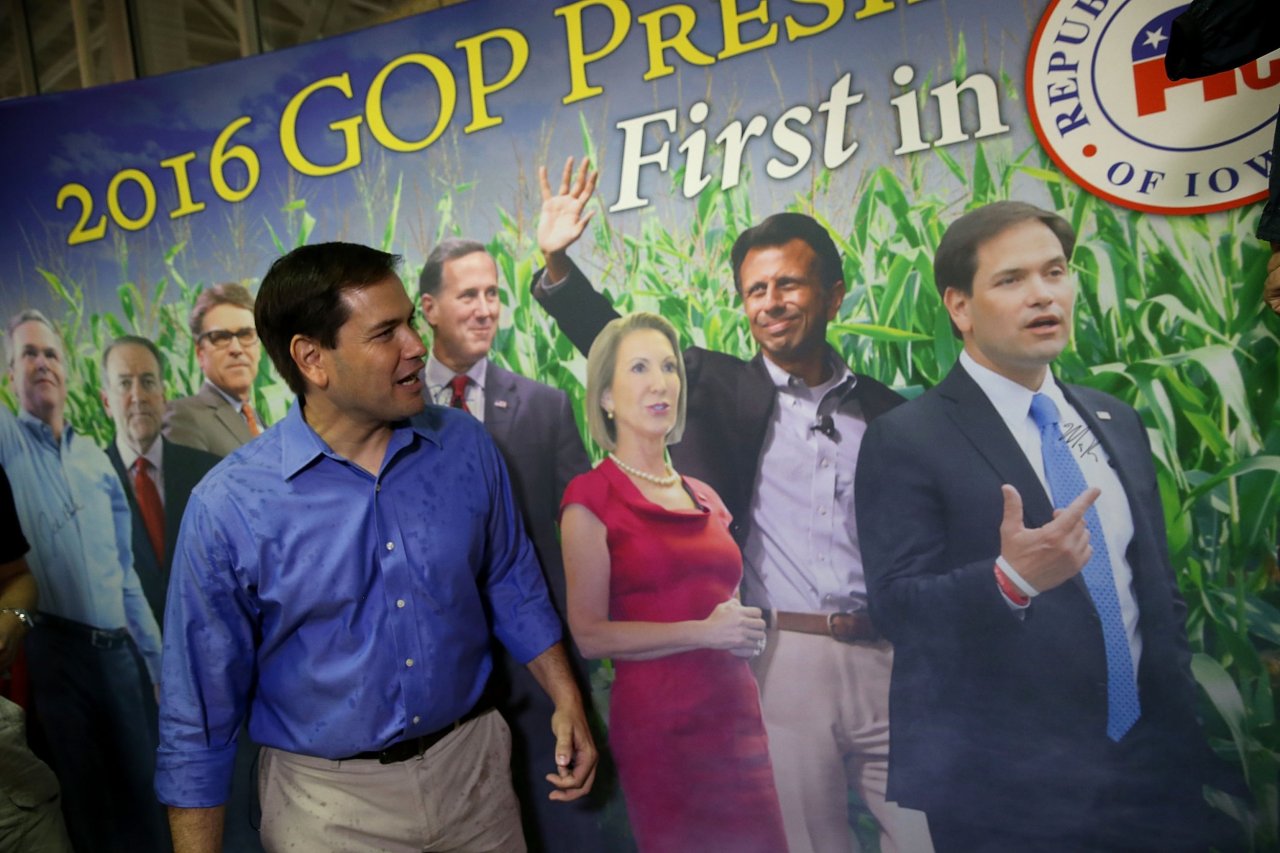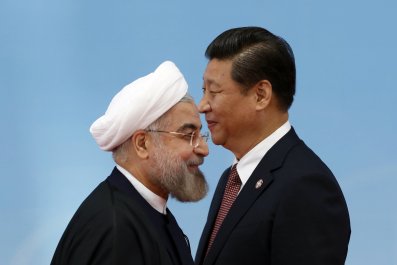When Florida Senator Marco Rubio voted against a transportation funding bill in December, he said one of his main objections was that it "preserves Washington's power in picking winners and losers in transportation funding, and even revives the crony capitalist Export-Import Bank," an agency that provides export financing for American goods.
Rubio, however, also likes to pick winners and losers. He supports sugar subsidies, explaining to Chuck Todd on Meet the Press in January, " I believe agriculture, unlike any other industry, should be treated a little differently.... We are competing against other countries that don't have our regulations, don't have our labor laws and subsidize their own industries.… I am prepared to get rid of the sugar program tomorrow if the countries we compete against get rid of theirs."
Of course, defenders of the Export-Import Bank use much the same argument. "With nearly 85 other export credit agencies around the world trying to win jobs for their own countries, EXIM Bank helps level the playing field for American businesses," its website reads.
Rubio's selective definition of "crony capitalism" is part of a dance all the Republican presidential candidates are doing as corporate handouts, once part of the political orthodoxy, have become a capital offense for an influential band of conservatives. Most of the candidates now disavow practices like special tax breaks and government subsidies—with an exception for energy subsidies for ethanol, the third rail of politics in Iowa, thanks to the state's powerful corn growers. But their records show they fully embraced those practices in the past.
The phrase "crony capitalism"—also known as corporate welfare—has been around for decades, but it became a GOP buzzword only in the past few years. Former Florida Governor Jeb Bush dedicated an op-ed to it in in October, promising to "clean house" in Washington. "There are tens of billions of dollars of corporate welfare subsidies tucked into the federal budget. An honest effort to cut the deficit should start here," he wrote. Despite the predictable backlash in Iowa, Texas Senator Ted Cruz has stood firm in opposing ethanol subsidies on the principle that they're corporate welfare—although he has softened his rhetoric somewhat, committing to the phase-out timeline currently in place, rather than ending them right away. Sarah Palin also raised the specter of cronyism in her January speech endorsing Donald Trump, while omitting that Trump happily accepted property tax abatements for his developments and lobbied for special tax breaks for his latest marquee project—a Trump hotel at the District's Old Post Office. Cruz suggested in January that the establishment was starting to line up behind Trump because "Donald has promised to make deals and to continue the cronyism and corporate welfare of Washington."
Promising to fight crony capitalism is not only a way for Republican candidates to curry favor with Tea Partyers—it also lets them condemn the status quo and tap into the seething populism roiling American politics.
In essence, the term refers to the cozy relationship between big government and big business and the policies that result, benefitting favored industries or companies ("picking winners and losers," you'll often hear critics say). Chris Edwards, director of tax policy studies at the libertarian-leaning Cato Institute, considers there to be three types of crony capitalism: direct spending (like farm subsidies); narrow, unjustified tax breaks; and regulatory advantages. Some of the prime examples critics have zeroed in on recently: the auto bailout, Troubled Asset Relief Program and clean energy subsidies. For years, supporting those types of government perks (or pork, if you will) was part of being a good, pro-business Republican. Both the House and Senate voted unanimously to reauthorize the Export-Import Bank twice last decade.
For a long time, "it was called 'constituent services,'" anti-tax crusader Grover Norquist says. "People bragged about it—'I brought a mastodon back to the village.'" But in the last six years, there's been a "huge, huge shift" in terms of how the Republican Party thinks about government goodies. It started, Norquist says, in 2010, when Republicans took back the House with the help of Tea Party fiscal hard-liners. One of their first reforms was chucking the age-old practice of "earmarks"—allowing members of Congress to insert funding for pet projects into legislation. That changed the way Washington works in profound ways, eliminating the ability to buy "yea" votes by tucking in tens of thousands for a home district infrastructure project here and half a million for a state's leading industry there.
The complaint is that earmarks resulted in a troika of big government abuses: bloated budgets, corruption and favoritism. Corporate subsidies and tax breaks didn't get the same attention initially, but think tanks like Cato and the conservative Heritage Foundation, as well as the Koch brothers and the many groups they fund, have been raising the same laments about crony capitalism with increasing frequency.

Most of the GOP presidential candidates have shifted their rhetoric accordingly, but they can't shake their records. Rubio continues to defend sugar subsidies, a major cash crop in his home state, second in value only to oranges . The Fanjul family, owner of Florida's largest sugarcane company and co-owner of the world's biggest sugarcane refiner , has donated hundreds of thousands of dollars to Rubio's federal campaigns. Rubio has criticized GOP primary rival Cruz for flip-flopping on federal crop insurance cuts, a priority in ever-important Iowa. But, as a Florida legislator, Rubio embraced programs similar to what he's now lambasting.
In 2002, for example, Rubio sponsored an earmark for $400,000 for the Florida Services Export Program, which, like the Export-Import Bank he now rips, is designed to facilitate foreign trade and investment for private companies. The earmark request describes FSEP as a "statewide program to facilitate services, trade, and investment in Florida."
Rubio also requested a minimum of $1.25 million in public funding for Florida's five college football bowl games in 2001. Erstwhile presidential candidate Scott Walker, the Republican governor of Wisconsin, was hammered last year for supporting public funding (on a much larger scale) for a new arena for the NBA Milwaukee Bucks. In a piece for the conservative National Review, Cato's Michael Tanner labeled Walker's backing of that funding "a quintessential example of crony capitalism." Rubio's campaign notes that he did not make any earmark requests in his final four years in the state legislature. "When he ran for Senate, Marco's conservative Florida House record was closely reviewed and earned him the endorsement of the nation's most respected fiscally conservative organizations and leaders," says spokesman Alex Burgos. "As a senator, he has consistently opposed crony capitalist priorities like the Export-Import Bank."
Bush is also a recent convert to the anti-cronyism movement. As Florida's governor, he used a public-private partnership formed under the previous governor to promote his economic vision for the state. Enterprise Florida Inc. was intended to draw half its budget from government funds and half from private enterprise, but "they've never achieved that," says Ben Wilcox, research director for the watchdog group Integrity Florida. "Ninety percent of the money comes from taxpayers."
Bush's signature economic project as governor was luring biotech researchers and firms to the state. Using Enterprise Florida and other state funds, his government doled out more than $300 million to Scripps Research Institute, $155 million to Burnham Institute for Medical Research and $32 million to the Torrey Pines Institute for Molecular Studies, according to a 2006 government audit report . In the past, Bush and his spokespeople have defended the biotech subsidies—which have yet to achieve the economic benefits he promised—as an investment in important research and economic diversification. But Edwards, of Cato, says "that's absolutely corporate welfare. I don't think it's good for the economy. I just think it's completely unfair." The Jeb! 2016 campaign did not respond to Newsweek requests for comment.
"That stuff is rampant in the states, and it's gotten a lot worse in the last 20 years," Edwards continues. Ohio Governor John Kasich is also a big proponent of using tax breaks to lure companies to his state through a public-private partnership known as Jobs Ohio. But unlike Bush, Kasich has not been as vocal attacking crony capitalism in his presidential campaign.
One Republican candidate who has been outspoken on the issue is Carly Fiorina, who uses the term "corporate cronyism" regularly as a catchall for what ails Washington. But when she was CEO of tech giant Hewlett-Packard from 1999 to 2005, lobbying records show the company pushed for preferential government treatment, including a 2004 jobs bill that the left-leaning Urban Institute labeled "a potpourri of new tax breaks for businesses." The Fiorina campaign says it does not contest that a "corrupt" federal government is good for big businesses like HP. "Carly often mentions how while she was at HP, they had the money to hire the accountants, the lobbyists and the lawyers to manage complexity. However, the nine-person real estate firm like the one Carly started in does not," says Fiorina campaign press secretary Anna Epstein.
The one candidate who gets high marks on fighting crony capitalism from Heritage Action is Cruz. The conservative policy advocacy organization says he "has a strong track record of opposing big-government regulations and other policies that favor the well-connected."
Norquist, for one, says a candidate's record isn't as important as what he or she is promising, given the seismic shift the party has undergone on the issue of cronyism and pork. What's most notable to him is that, with the exception of a few "leftover commitments" (Rubio's sugar subsidies, he says, are one), "nobody out there is going, 'No, no—corporate welfare is a good idea.' The rules changed, and they changed for everybody."




















